Top 10 Tips that will make your cycle tour in India extremely easy
In the post-COVID world, a profound shift has occurred in people’s perspectives, emphasizing the transient nature of life. This realization has sparked a surge in global travel, with some embarking on journeys around the world, while others, unable to do so, indulge in consuming travel content on social media. The rise of cycle touring vloggers has been particularly notable, reflecting a trend that has drastically transformed in just three years.
Looking back to a mere three years ago, the number of cyclists embarking on an all-India cycle tour was minimal and could be counted on one’s fingers. Fast forward to 2023, and there is now at least one rider commencing a cycle journey in India, whether it’s for the Char Dham Yatra, Bara Jyotirling Yatra, or an expedition across the entire nation. Many of these cyclists start with little to no prior knowledge, learning valuable insights along the way on how to optimize their expeditions with a few key adjustments.
Having traversed over 9500 kilometers in India over the past 8 months, I’ve continually gleaned practical tips from fellow cyclists, refining my approach to make cycle touring in India a seamless experience. In this article, I share my top tips to ensure that your planned cycle touring journey in India flows effortlessly.
The luggage
Initiating your cycling journey with a heavy load is a common pitfall, and I’ve experienced it firsthand. The foremost and crucial tip is to minimize your cycle’s weight to ensure absolute comfort during the ride. Many cyclists delay their start until every item on their checklist is accounted for. I’ve penned a comprehensive article on carrying the minimum luggage (https://cycletourindia.com/what-and-how-to-pack-for-an-all-india-cycle-tour-the-complete-checklist/), drawing from my own experience of halving my initial load since embarking on this journey.
Rather than overburdening yourself initially and shedding items along the way, my advice is to commence with essentials and assess if additional purchases are necessary during the journey. There are ample opportunities to acquire what you need en route. Begin your ride with just:
1. Three pairs of clothes, including innerwear. 2. A tent and a sleeping bag. 3. Toiletries. 4. Essential cycling tools: a small pump, cycling tube, levers, and an Allen key. 5. Electronics tailored to your travel requirements.
Throughout 95% of my journey, I’ve found only these items necessary. Anything beyond this constitutes a luxury, often accompanied by its own set of drawbacks.
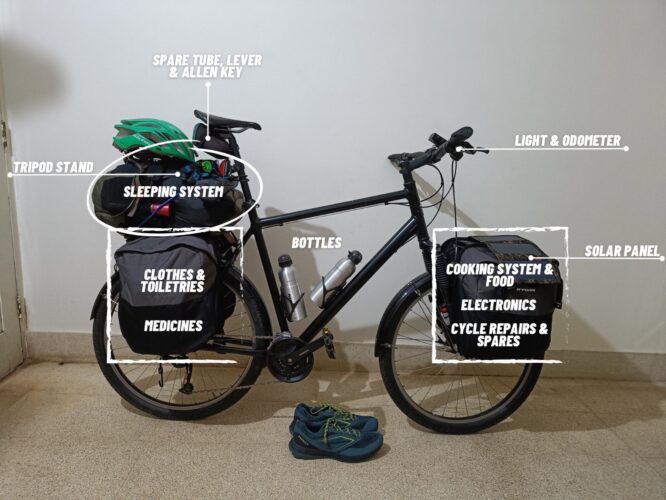
The right cycle
Apart from yourself, the most crucial component of your journey is your bike. Ensuring not only a comfortable but also a safe travel experience requires the right frame size. I’ve delved into the intricacies of selecting the ideal bike for a cycle tour in India in a comprehensive article (https://cycletourindia.com/which-cycle-is-best-for-touring-in-india/). While strength and endurance are valuable assets, attempting to cover the entire expanse of India on a single-speed cycle, without the right frame size, may lead to injuries despite one’s fitness.
Beyond choosing the correct cycle frame size, my top advice is to incorporate a quick release mechanism for your wheels (refer to this article). This feature facilitates swift flat tire repairs and allows you to compactly transport your bike in smaller trucks and buses when needed.
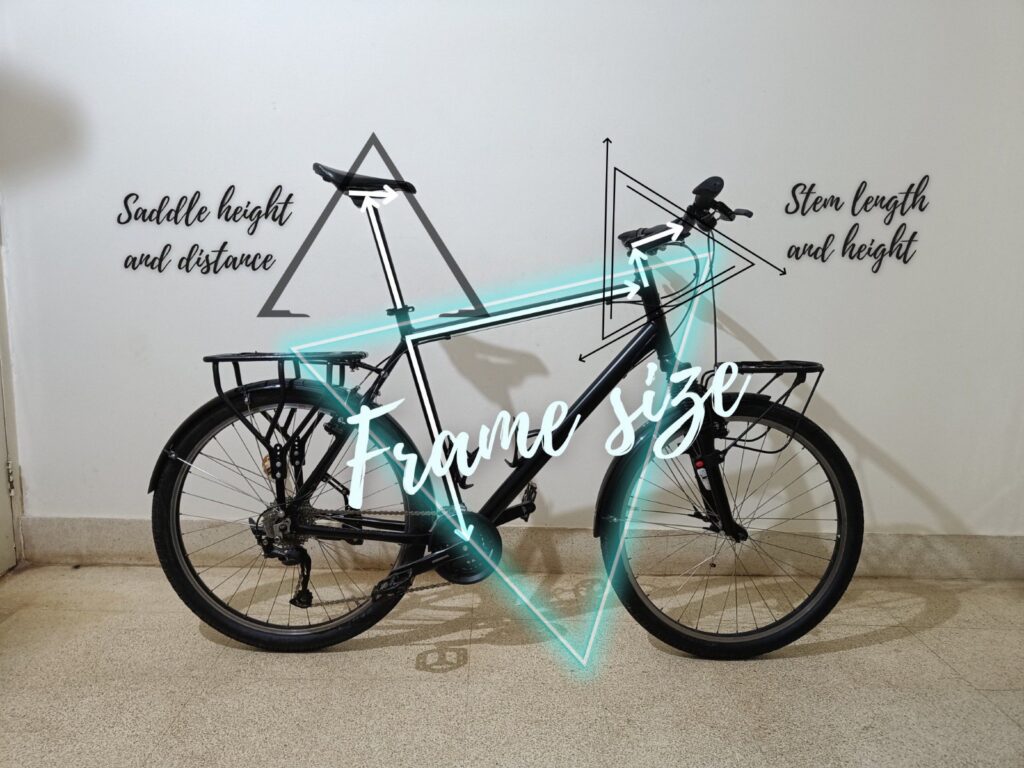
Sponsorship
Securing sponsorship for a cycling journey is a coveted goal, offering invaluable assistance in covering essential expenses such as gear, accommodations, food, and accessories. However, for a novice cyclist, obtaining sponsorship can seem nearly impossible. To navigate this challenge, I explored alternative avenues to reap benefits from various sources. One effective strategy I employed was seeking a letter from an influential government official, urging government offices to assist with my food and stay arrangements (https://cycletourindia.com/how-to-get-the-government-sponsor-you-on-an-all-india-cycle-tour/).
Given that a cyclist’s significant expenses revolve around food and accommodations, the prospect of staying in government guest houses and inspection bungalows, strategically scattered across the nation, substantially lightens the financial burden. This approach provides a streamlined way to secure sponsorship for your cycle tour without the need to broadcast sponsor messages or concern yourself with selling products to your audience.
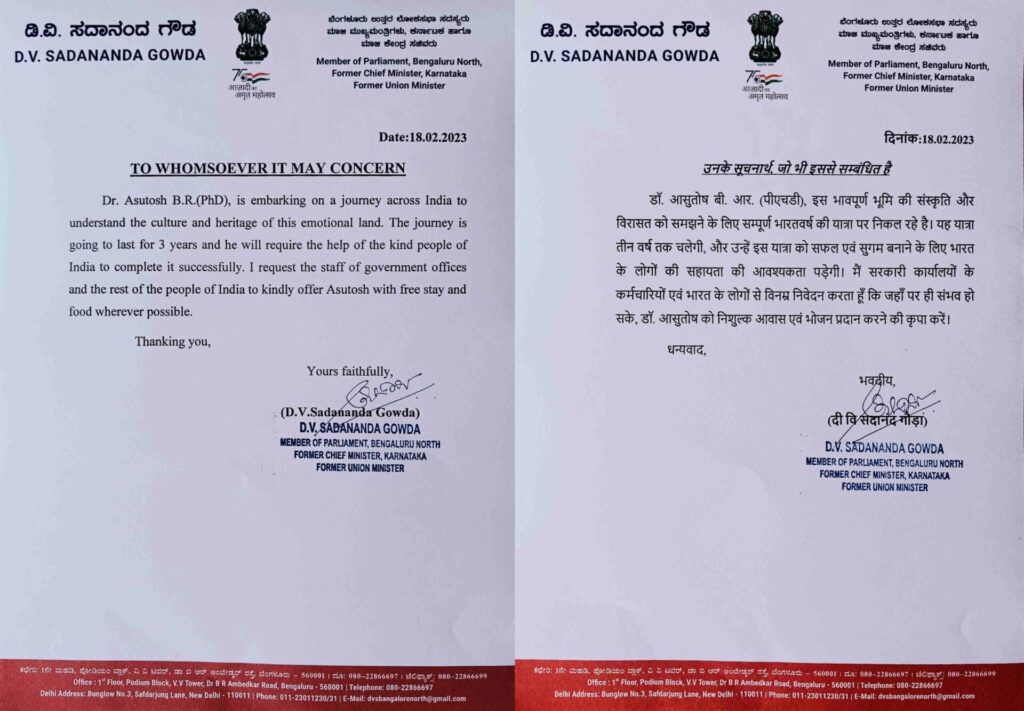
Stay
The only expenses a cycle tourist typically faces while traveling are for stay and food. Implementing a couple of savvy strategies can entirely eliminate these costs and alleviate the stress of finding accommodation on most days. Many cyclists, when starting their journey, often rely on petrol pumps to pitch their tents for the night. However, this isn’t the sole option, and it’s far from the best available. In fact, throughout my entire cycling journey, I have not once pitched my tent at a petrol pump—my last and least preferred choice.
The optimal stay involves securing a room with a bed and a washroom for a comfortable night’s rest. Leveraging the government letter I possess, my primary priority is to locate inspection bungalows or government rest houses, ensuring all necessary facilities. Advanced planning using maps the day before helps streamline my cycling journey. My second preference is Gurudwaras, where not only do I find a comfortable stay and a washroom, but I’m also provided with food through the Langer system, available three times a day. A quick map search facilitates this approach.
For tourist spots around large temples, keep an eye out for Bhakti Nivas, offering free stays. Additionally, temples often have Dharamsalas in the vicinity, providing affordable stays to visiting tourists. Presenting the government letter or explaining your long journey may secure a stay free of charge.
Even if these options are unavailable, pitching a tent in small temples with resident priests remains a preferable choice. Temples with priests are found in every town along the way, and locals can guide you to the right place. Alternatively, approaching houses in villages with large verandas, explaining your situation, and requesting to pitch a tent can be a culturally enriching experience.
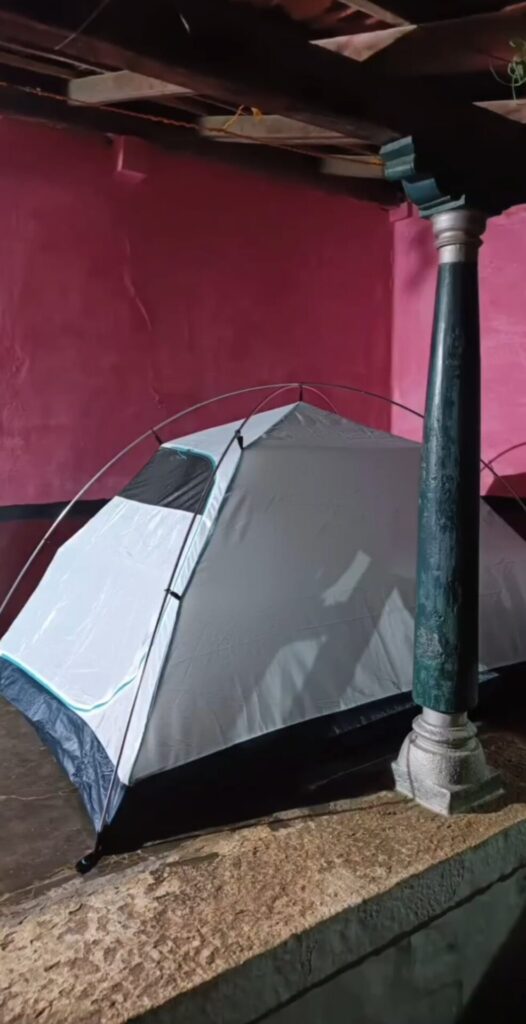
Innovative alternatives include visiting NGOs, where contributing kind words and time may secure support for accommodation and local guidance. Another valuable resource is the Couchsurfing application, detailed in subsequent sections below.
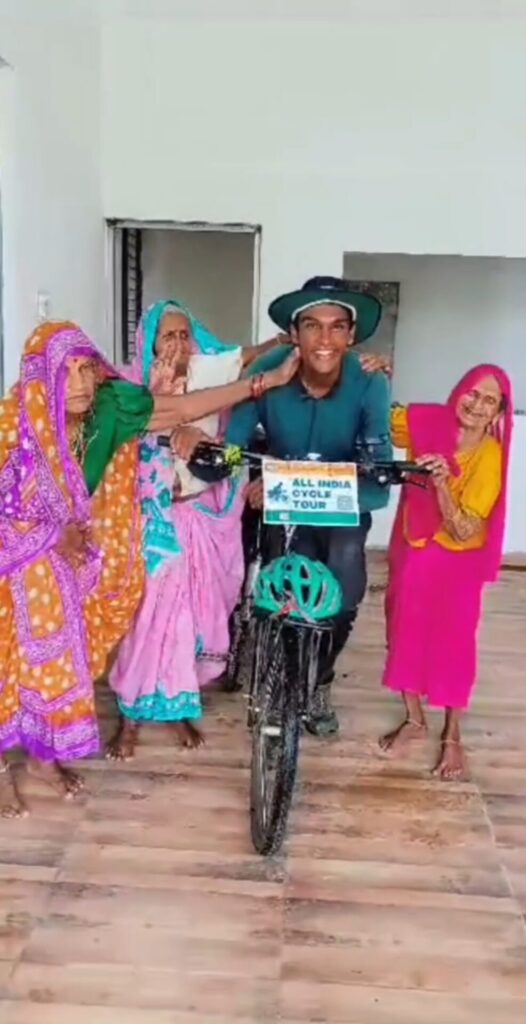
Food
As much as finding accommodation occupies the cyclist’s thoughts, the daily expense of purchasing food plays an equally significant role. Many cyclists often rely on biscuits in the morning and frequent dhabhas for lunch and dinner, contributing to substantial expenses. While this may seem like the only viable approach, a small change can open the door to savoring the diverse ethnic foods of the places visited during the journey—simply requesting food in houses along the way.
As unconventional as it may sound, this strategy genuinely works. In India, people are inherently curious and uphold the belief that guests are akin to God (Athithi Devo Bhava). Drawing from ample experience, I can assure you that you typically won’t need to request food from more than three houses anywhere in India. Approach anyone standing outside a house, preferably a farmer’s residence, and convey that you are a traveler seeking a meal at their home. In most instances, the person will gladly invite you in and offer a meal. If not, the likelihood of encountering that person again is minimal. Over time, you’ll become accustomed to this idea, eventually forgetting the need to eat in hotels or dhabhas.
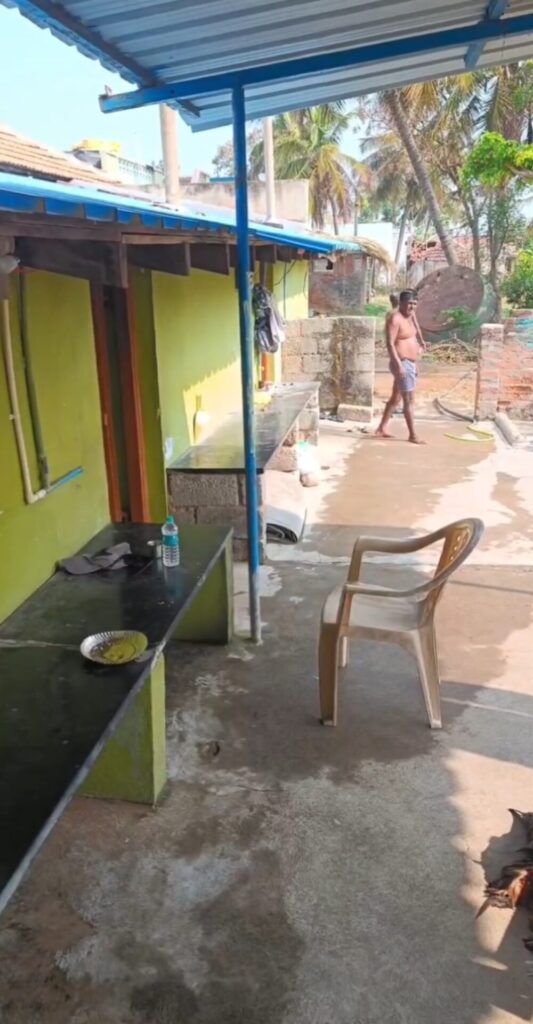
Sleep
Quality sleep is the second most crucial aspect of travel, complementing the journey itself. A restful night is imperative for full recovery, ensuring you can derive maximum enjoyment from your travels. Transform your tent into a mosquito net, and always carry a pair of earplugs to shield yourself from external sounds.
During my travels, I discovered that city dwellers, including myself, tend to stay up late and wake up late, a stark contrast to the early sleeping and waking habits prevalent in rural India. Establishing a routine of sleeping early and waking up early aligns your circadian rhythm, promoting overall well-being. It’s a beneficial habit to adopt before embarking on your journey; the sooner you adjust, the smoother your experience will be. If you pitch your tent in a well-lit area, consider using a dark tent or an eye cover to block out light and enhance your sleep quality. For daytime rest, seek out the shade of large trees or dhabas to create a comfortable resting spot.
Network
Building a network is paramount in our travels, especially as tourists often miss out on local gems that are worth exploring. Locals play a pivotal role in unveiling these hidden treasures. Always ensure you collect phone numbers from helpful locals or those who extend a friendly handshake as you pass by. Share your own number and stay connected with them for the next few days. Leveraging their local knowledge, they can assist in arranging accommodations and connecting you with individuals who can guide you through the area.
A savvy strategy is to frequently update your WhatsApp status, indicating your current location and your next destination. Accompany this with a request for contacts in the upcoming location who might be willing to help with your travel. You’ll be surprised by the number of people eager to assist with accommodations and local insights.
Before embarking on your journey, download Couchsurfing on your phone. If you’re unfamiliar with the application, take a moment to familiarize yourself and create a profile. Couchsurfing is a platform where travelers can find free accommodations in the homes of locals willing to host fellow travelers. The entire platform operates on goodwill, and building connections here can enable you to explore larger cities and tourist destinations in India with the guidance of a local host.
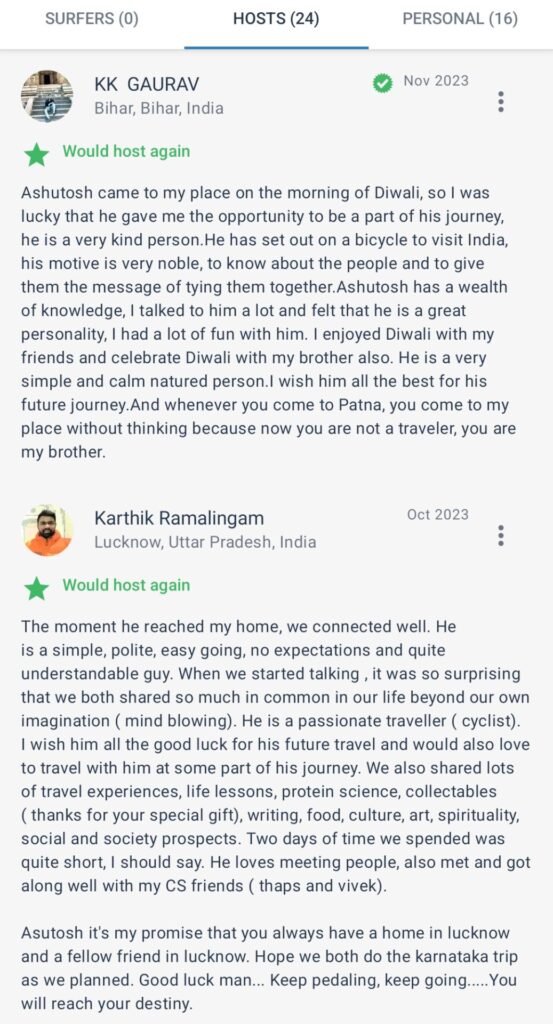
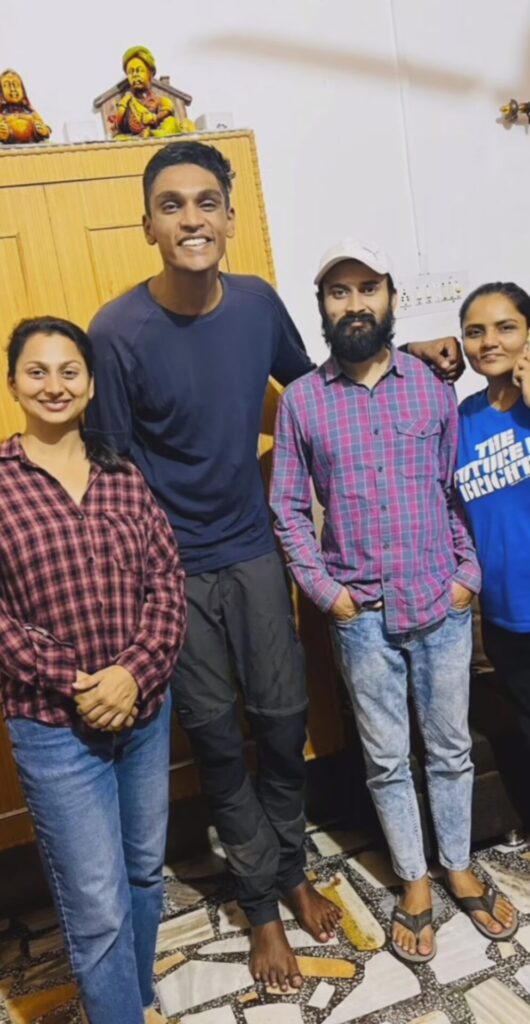
Funding the travel
Even with sponsorship from top firms, travelers often need to dip into their own pockets. With a few strategic ideas, you can not only make your journey cost-effective but also remarkably inexpensive. I’ve previously explored the costs associated with an all India cycle tour in an article available here.
First and foremost, display a board announcing your nationwide journey and include a QR code for online payments, creating an effective crowdfunding strategy for three square meals a day. Passersby are likely to inquire about supporting your journey, and having a QR code readily visible can garner financial assistance to propel you forward.
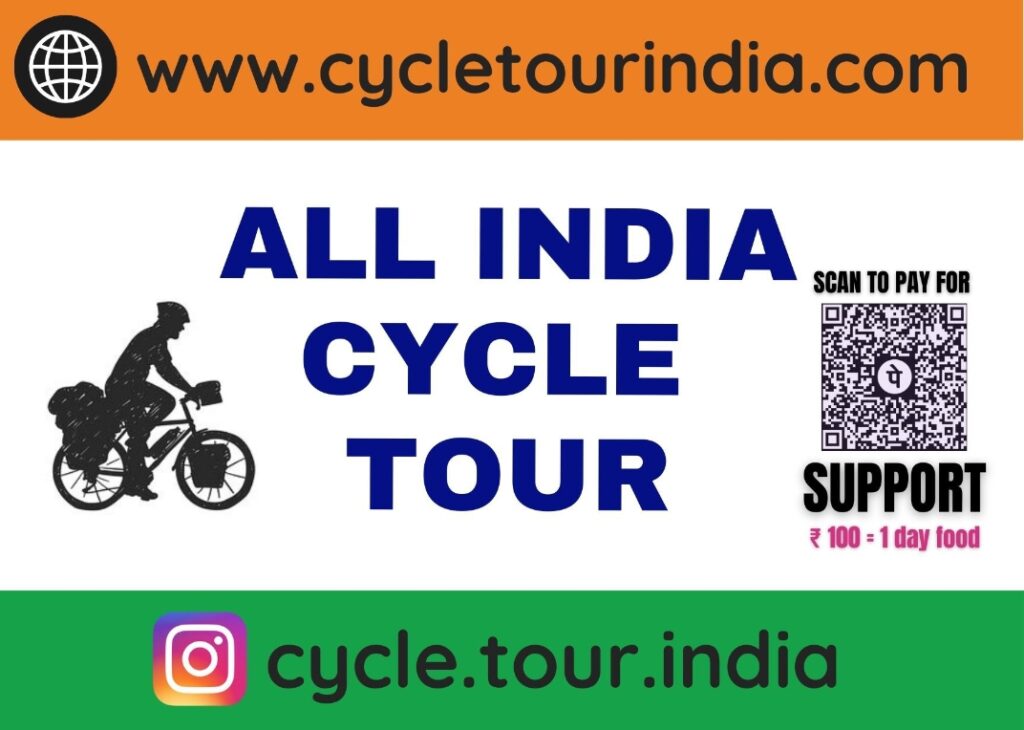
Explore additional sources of income by utilizing your skills to provide services to people along your route. Offer your services for free, whether it’s fixing phones and laptops, teaching English, assisting with home renovations, or helping individuals shoot and edit videos for their social media platforms. Providing such services often results in reciprocal favors and, in some cases, direct payments. I’ve found it effective to visit schools and offer career guidance and motivational talks to students, receiving money from principals without solicitation.
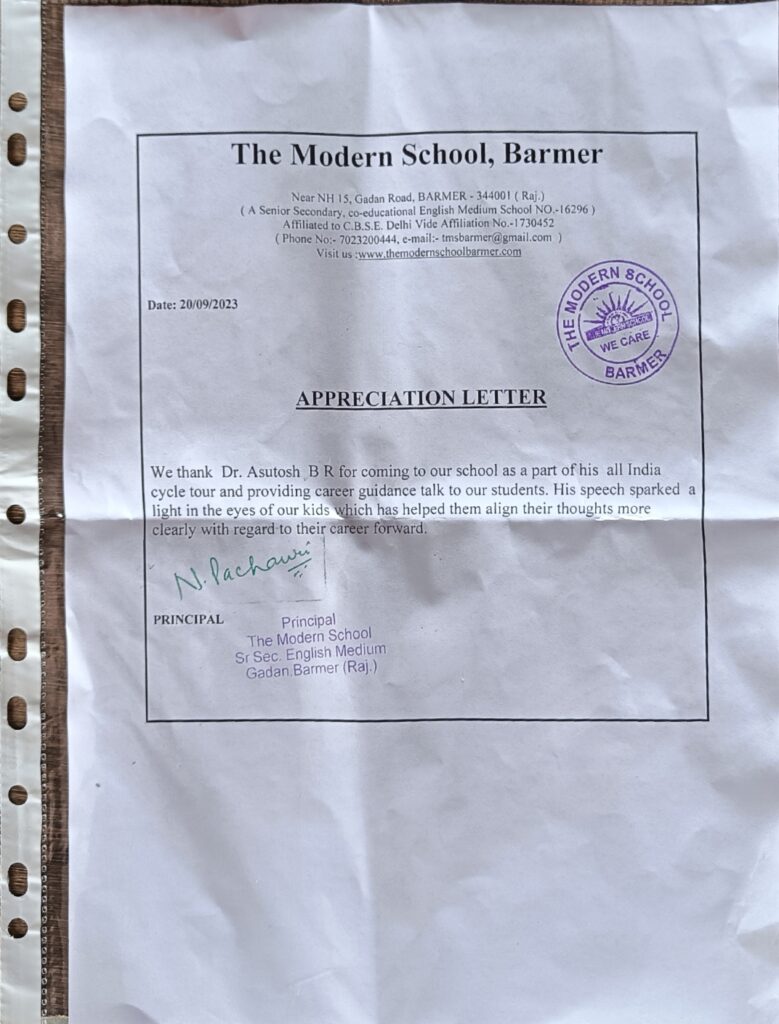
For added innovation, collect interesting items during your journey, such as seashells or relics, and consider selling them at local fairs by setting up a small stall. This creative approach allows you to generate additional income during your travels.
Shower and washing clothes
During my journey, I encountered a common challenge among cyclists – difficulty finding places to shower not due to water scarcity, but the absence of a suitable container. While handpumps and taps are abundant throughout India, the ubiquitous Indian bucket is not universally available. To effortlessly overcome this hurdle, a simple solution is to carry your own.
I discovered an affordable 20-liter dry bag on Amazon that conveniently folds into the size of a wrist, capable of holding water without leakage. Having this compact water container enables you to collect water and use it as a versatile bucket for both showering and washing clothes wherever you go. Additionally, carrying a small airtight box containing body soap and clothes washing soap serves a dual purpose as a tub for your showers. After implementing this solution, you’ll likely find yourself thankful for the practicality it adds to your entire journey.
Link: https://www.amazon.in/Vepson-Waterproof-PVC-Dry-Sack/dp/B0756VK4BC
Avoiding fear of theft
The greatest concern for a cycle tourist is the potential theft of their bike and its laden luggage when exploring various locations. Through conversations with fellow cyclists and thorough research, I discovered an effective method to alleviate this fear, allowing you to visit any place with peace of mind and enjoy sound sleep at night.
Invest in a pair of locks equipped with sensors that emit a beep when your cycle is disturbed. These locks are readily available online for as little as 400 rupees. Provide the remote control to a nearby shop, instructing them to press a button when the alarm activates. Convey that the bike is fitted with GPS, implying that any theft attempt will be instantly thwarted. While the GPS claim may be untrue, it serves as a deterrent, preventing potential thieves from targeting your valuable bike. Before sleeping, ensure all your luggage is inside the tent, and secure the bike to the tent. If the locks beep, it indicates that someone has tampered with the bike, allowing you to take swift action.
Link: https://dl.flipkart.com/s/GsQM3wuuuN
Another concern during the journey is the potential loss of one’s phone. Extended travels increase the likelihood of accidentally dropping or having our phones stolen. I’ve devised a brilliant tweak to address this issue, which you can find detailed in this article (https://cycletourindia.com/how-can-i-plan-a-safe-all-india-cycle-tour/). Additionally, I share articles featuring intriguing individuals I encounter on my journey. I encourage you to explore my website for more insights. If you found my articles helpful, please take a moment to drop a comment below and share your thoughts. Wishing you a joyful cycling journey in India!
I am a 31 year young PhD graduate who has decided to travel the length and breadth of India on my cycle, to document the journey of meeting a vast array of people. In my journey, I intend to understand the characteristic features of the people of this nation and categorize them based on their demographics, age, profession, gender, traditions, and cultural differences.